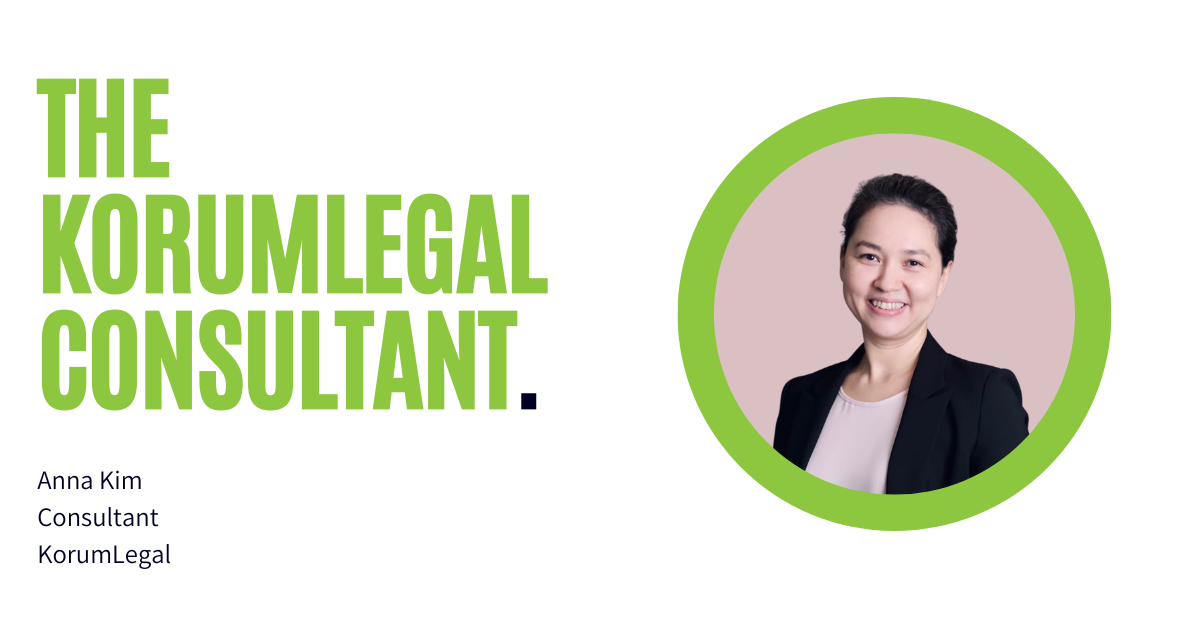KorumLegal Consultant: Anna Kim believes ALSPs have become integral players in the legal ecosystem.

This month, our KorumLegal Consultant is Anna Kim, an experienced legal advisor specialising in engineering, construction, and procurement projects. With deep technical expertise in drafting and negotiating EPC contracts, Anna brings strategic insight to both commercial and contentious matters. Anna also advocates for smart, tech, and AI-enabled legal work that delivers effective advice at a predictable cost.
1. Hi Anna! Can you tell us a little about the work you are currently doing and have been doing?
Clients usually come to me for advice on contract terms. If I am engaged during the deal negotiation stage, I help clients draft terms and come up with negotiation strategies that would achieve their business objectives. If I am engaged when the client has problems with their counterparty, I help the client analyse their contract terms and strategise on how to resolve the conflict without derailing the relationship.
My undergraduate degree is in computer science, so naturally I am steered towards clients whose business model is centred around technology or engineering. I have represented large construction and manufacturing companies as well as startups.
Feel free to connect with Anna on Linkedin here
2. What made you take the leap into working in NewLaw for ALSP's? And why is it a good fit for you?
I’ve always been an optimiser. Even as a child, I’d map out the most efficient route to complete chores – minimising steps, maximising results. That mindset defines how I approach legal work. I like to optimise my work processes so that I can deliver effective advice at predictable cost.
New Law and ALSPs resonate with my philosophy. ALSPs do not shy away from using the most recent technology toolkit which positions them to deliver results through lean processes.
This model allows me to focus on strategic, high-impact work without the overhead of conventional practice, making it a natural fit for my skills and my clients’ needs.
3. What's the most rewarding assignment you've ever had and why?
One standout project involved advising a shareholder of a battery technology startup navigating his relationship with his business partner. When the client found me, he was in business with his partner for a few years. They had developed proprietary technology and built a pilot plant. But when the first large orders rolled in, they began having disagreements on strategy and the future of the business.
Crucially, they’d never formalised their partnership in a shareholders’ agreement. Negotiations were challenging. We had to navigate between the need for contractual precision and the emotions of the partners whose relationship was strained. I thought to myself – my work is not much different from that of a marriage counsellor!
By aligning the partners’ long-term goals, we were able to agree on the terms that would ensure the commercial viability of the project. My ability to “speak” tech and law allowed me to bridge the gap between my client and his partner, who was an engineer and was concerned with the technical matters.
It was rewarding to see the partners reach a mutual understanding and their relationship recover.
4. As an experienced NewLaw/ ALSP consultant, where do you see NewLaw/ ALSPs fitting into the matrix of the legal sector and how have you seen it evolve?
ALSPs have become integral players in the legal ecosystem, particularly for transactional and compliance-driven work. They fill a gap between in-house teams (who may lack bandwidth) and traditional firms (which can be cost-prohibitive). Over the past five to seven years, I’ve seen ALSPs shift from handling routine tasks (like NDAs or basic compliance) to leading complex, project-based engagements, such as cross-border M&A. Clients now view ALSPs as partners for end-to-end solutions, not just outsourcing vendors. ALSPs are also pioneering the adoption of legal technology in ways traditional firms often struggle to match.
5. What trends do you expect to see in the legal services industry in the next 5 years?
Three trends stand out.
First, the use of AI and automation will become an industry standard allowing lawyers to focus on high-stakes strategic work. Contract lawyers already use tools that automate clause extraction or predict negotiation outcomes. Over time, the tools will only become more advanced and their adoption more widespread.
Second, we’ll see more “fractional” legal roles. Companies increasingly need deep expertise without the cost of full-time hires.
Finally, alternative fee models (e.g., subscription-based or outcome-linked pricing) will become mainstream. Clients want predictability and lawyers want to align their incentives with outcomes.
6. Your favourite tune? And why?
One of my favourite tunes is Smokin the Boys by Audra Mae. It never fails to uplift my mood. I especially like listening to it when I drive.
Lily Evans and Anna Kim
Jun 11, 2025
Related Posts.
By: Lily Evans and Till Lembke
Featured in our GC Spotlight Series this month is Till Lembke, who is the Group General Counsel and Company Secretary at the Hongkong and Shanghai Hotels, Limited (HSH). He was seconded to HSH..
By: Natasha Norton
Product Legal Counsel 101: Why your company needs one
In the dynamic landscape of modern business, where innovation is paramount and regulatory compliance is complex, having a specialised legal professional dedicated to product-related matters is..
